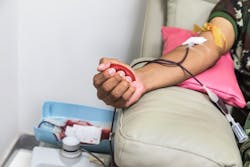The U.S. Food and Drug Administration announced it is proposing a change from time-based deferrals to assessing blood donor eligibility using gender-inclusive, individual risk-based questions to reduce the risk of transfusion-transmitted HIV. This proposal is in line with policies in place in countries like the United Kingdom and Canada.
Under the new proposed guidance:
- The time-based deferrals for men who have sex with men (MSM) and women who have sex with MSM would be eliminated.
- The current donor history questionnaire would be revised to ask all prospective donors about new or multiple sexual partners in the past three months.
- Prospective donors who report having a new sexual partner, or more than one sexual partner in the past three months, would then be asked about a history of anal sex in the past three months.
- All prospective donors who report having a new sexual partner or more than one sexual partner and had anal sex in the past three months would be deferred from donation.
- Under this proposal, a prospective donor who does not report having new or multiple sexual partners, and anal sex in the past three months, may be eligible to donate, provided all other eligibility criteria are met.
Other considerations in the guidance include:
- No change in the donor deferral time periods for other HIV risk factors, including for individuals who have exchanged sex for money or drugs or have a history of non-prescription injection drug use.
- Any individual who has ever had a positive test for HIV or who has taken any medication to treat HIV infection would continue to be deferred permanently.
- Blood establishments would still be required to test all blood donations for evidence of certain transfusion-transmitted infections, including HIV, hepatitis B and hepatitis C.
Proposed guidance related to pre-exposure prophylaxis (PrEP) or post-exposure prophylaxis (PEP):
- Those taking oral medications to prevent HIV infection such as PrEP or PEP would be deferred for three months from their most recent dose.
- Those taking injectable PrEP to prevent HIV infection would be deferred for two years from their most recent injection.
- Some blood establishments currently have deferral policies related to the use of medications to prevent HIV infections.
- The available data demonstrate that the use of PrEP and PEP may delay detection of HIV by licensed screening tests for blood donations, potentially resulting in false negative results.
About the Author
Sign up for our eNewsletters
Get the latest news and updates

